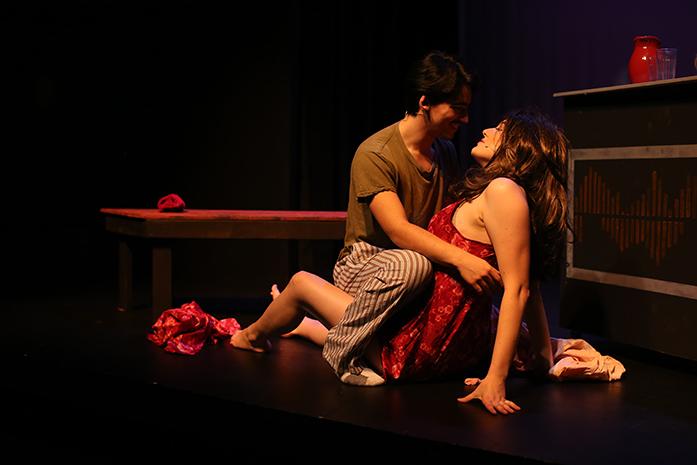By Claire Dietz
When Scott Bradley was a freshman at the University of Iowa, he told me, he was “immediately seduced by the Playwrights’ Workshop.” Now, years removed from his undergraduate career, he is bringing one of his works, Trocadero Rose, an unsung disco opera to the university stage.
Beginning its run at 8 p.m. today in the Theater Building’s Theater B, Trocadero Rose reimagines Verdi’s La Traviata in San Francisco at the height of the gay-liberation movement. The year is 1979, Harvey Milk has been assassinated, and the AIDS crisis is looming. But in a jam-packed disco nightclub, there is some semblance of safety to be found.
La Traviata famously also served as the inspiration for the 2001 jukebox movie-musical Moulin Rouge, directed by Baz Luhrmann. Seeing how effective the transposition of this classical narrative into modern times was, the gears in Bradley’s head began to turn.
“I was interested in the parallels in the gay community with those of us who had to sacrifice love because of society,” he said. “[It was] asking one or the other to give that up for a way of life.”
Bradley saw a “beautiful parallel” between the three-act opera and how DJs shaped the mood of the night through their music.
“The DJs would begin with this fun, playful music that would get people out and dancing on the dance floor,” he said. “Then you had the second act with the high-energy pulsing, also corresponding with the drug trip that was going at that point. And the third act, which is the early morning, where people are coming down for drugs and pairing off for sex.”
Originally, Bradley planned the play to be a full three-act opera, but then he had another idea. Instead of including a chorus of singers, he decided to include a group of dancers, transforming the operatic sonics into operatic movement spurred on by the pounding of disco drums.
“I thought, no, I need that electronic DJ set, which corresponds to the dialogue,” he said. “It will rise, crest, and resolve.”
One of the actors, Rob Petrie, said the play had quite the learning curve, not only with regard to the dance moves but also in coming to terms with the political climate of the late-70s, when it was a common occurrence for police to raid gay nightclubs.
“It’s about a couple in love who are pulled apart by forces out of their control,” he said. “It’s about the love in a family who doesn’t share blood but experiences and how they’ve found a home among each other when the rest of the world turned its back on them.”
Noting the difficulty with attempting to remain as authentic and true to the integrity of the piece as possible, Emma Genesen, the director of the production, found that some of the casting requirements could not be met easily.
For example: The roles of two transwomen ultimately were filled by cis women simply because of the local demographics. Despite the apparent pitfall, Genesen is hopeful, seeing this as a larger opportunity to facilitate discussion in the culture.
“We decided that this story was too important to keep silenced,” she said. “[It] would allow us to continue developing a script that will offer profound roles for transwomen, {when} the show is produced outside the university setting.”



